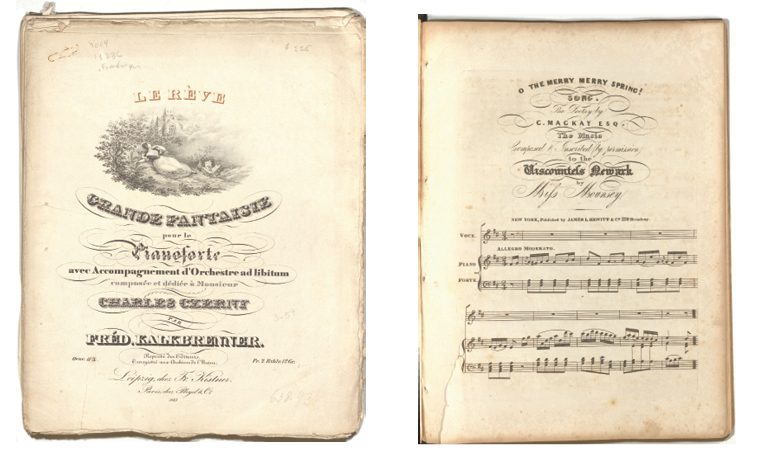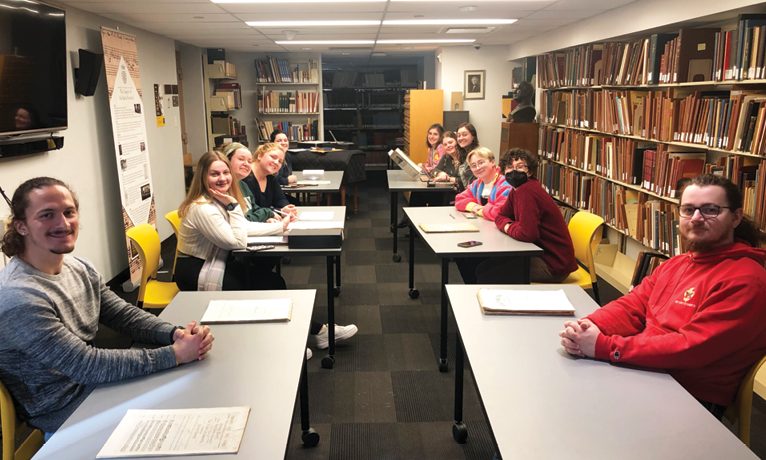Music history students create virtual exhibits using RBI Freedman Collection
In Spring 2023, students in Dr. Danielle Kuntz’s music history course on Classical and Romantic music created virtual exhibits showcasing rare items in the RBI’s Frederick Freedman collection. EXHIBITS>
The Freedman collection is a treasure trove of items for study, including works for keyboard, orchestral music, chamber music, and vocal music published between 1740 and 1860. Frederick Freedman (1934-1976) was a noted musicologist, music librarian, author, publisher, and collector. He held positions as a music librarian at Case Western Reserve University, The University of California at Los Angeles, The University of Iowa, and Vassar College. Additionally, he published more than fifty journal articles and was one of the founders of Da Capo Press. Along with his career in musicology and librarianship, he had a great passion for collecting sheet music and books. Fred’s widow, Jacqueline Kahane Freedman, donated his collection to the Riemenschneider Bach Institute in 2018. The collection includes many fine examples of British sheet music of the day, and many of the items are quite rare. There are string quartets, popular songs, hornpipes, quick steps, and diversions of all kinds. British and American culture of the time is manifested in lithographed covers, ownership markings, annotations, and even the occasional doodle.
Working individually or in small groups, students in the Spring 2023 music history course completed in-depth research on a piece by a composer represented in the collection. The students’ research revealed fascinating details about many lesser-known composers from the Classical and Romantic eras, including Teresa Carreño, Domenico Corri, Jan Ladislav Dussek, Veronika Chianchettini (Dussek), Alexis Garaudé, Frédéric Kalkbrenner, Friedrich Kuhlau, Joseph Mazzinghi, Ann Mounsey, Bernhard Romberg, Henry Russell, and Christoph Ernst Friedrich Weyse. The student exhibits will be posted to the RBI’s website and shared in an open house during Spring 2023 finals week.

(above) The Freedman collection is a treasure trove of items for study, including works for keyboard, orchestral music, chamber music, and vocal music published between 1740 and 1860. Frederick Freedman (1934-1976) was a noted musicologist, music librarian, author, publisher, and collector. (Pictured left) Le Reve READ MORE> and (right) The Merry Merry Spring READ MORE>
(below l-r) Sarah Carter ‘23(2021-22 RBI Scholar), Emily Dyko ‘24, Elizabeth Jorgenson ‘23, Grace Smith ‘23, and Justin McMullen ‘23

RBI Scholars Program Student Research
In 2021-2022, her junior year, Sarah Carter ‘23 received an RBI Scholar award to do independent research in the Riemenschneider Bach Institute. A flute primary majoring in composition and arts management, Sarah chose to develop a guide to flute materials in the RBI. Working with her faculty mentor, Professor Sean Gabriel, Sarah examined all books and scores pertaining to the flute. Of special note were four 18th- and 19th-century flute manuals, most of which were donated to the RBI by Dayton C. Miller, a BW alumnus and prominent physicist. Sarah documented these in detail, along with a number of modern editions inscribed by their composers. Her guide will be a boon to those working with flute materials in the RBI and should help facilitate further research. Since completing her RBI Scholar research, Sarah has developed a keen interest pursuing a career in music librarianship and archival studies, and has completed a subsequent honors thesis relating to the use of music archival materials, such as those found in the RBI, to achieve information literacy goals among undergraduate music majors. She has presented her RBI Scholar and Honors thesis research at several national conferences including the Music Library Association Midwest Chapter Annual Meeting (2022), Mid-East Honors Association Conference (2022) and National Council for Undergraduate Research (2022).
2022-2023 RBI Scholars Program
In the 2022-2023 academic year, four students were awarded the opportunity to pursue independent, faculty-mentored research projects using RBI materials. Emily Dyko ‘24, a flute primary, has used manuals by John Gunn and Charles Nicholson to explore questions of flute pedagogy in the late 18th and early 19th centuries. Emily’s research is an outgrowth of the RBI Scholar project completed by Sarah Carter in 2021-2022. Emily aims for this research to inform her own performance of pieces from this era. Elizabeth Jorgenson ‘23, a violin primary, has combined her interests in historical study and strings to complete an in-depth study of the viola d’amore, an instrument that is obscure today but was common in the Baroque era; in completing this project, Elizabeth has studied both the Conservatory’s own fine instrument, a 1924 viola d’amore, as well as RBI documents relating to its performance practice. Grace Smith ‘23, a member of the Conservatory fraternity Mu Phi Epsilon, hasused her knowledge of arts organizations to study the history and impact of philanthropic giving to the Conservatory by Mu Phi alumni. Mu Phi, BW’s chapter of Mu Phi Epsilon, was chartered at BW in 1926 under the leadership of Albert and Selma Riemenschneider, and holds its archive in the RBI. Many influential Mu Phi Epsilon alumni have contributed significantly to the Conservatory and RBI, including such notable figures as Selma Riemenschneider, Arline Kadel, and Elinore Barber.
This year’s Evelyn A. Gott scholar, Justin McMullen ‘23, has delved into the Jack Lee Collection. Jack Lee (1929–2016), a distinguished alumnus of BW who enjoyed a successful Broadway career, donated his impressive collection of scores, scripts, books, and other materials. Justin exploresStephen Sondheim’s Company (1970) and its complex messages about marriage. He presented his research during the Bach Festival.
BACH: Journal of the Riemenschneider Bach Institute
Most of us do not realize that the notes we hear at the Bach Festival may not have been the same notes Bach heard. In the Baroque era, tuning and temperament were hotly contested issues, and the pitch of each note, as well as notes’ relationship to each other, could vary from one performance to the next. The Fall 2022 issue of BACH: Journal of the Riemenschneider Bach Institute addressed this complex topic, still the site of much controversy today. Co-edited with one of the foremost experts on tuning and temperament, Ross W. Duffin, the issue features articles by scholars and performers whose research and practical experience inform their approaches to the fundamental question of what notes Bach heard. The journal’s Spring 2023 issue features Robert L. Marshall’s rumination on Bach’s Late Style, an extensive exploration of the uses of Bach in 1960s popular music by Thomas Cressy, a fascinating glimpse into the life of music students in Leipzig by Barbara Reul, and an investigation of potential models for Bach’s Mass in B Minor by Zoltán Göncz. The upcoming September 2023 issue, Bach and the Art of Movement, co-edited with Reginald L. Sanders, will explore how choreographers have responded to Bach. For more information and to subscribe, see https://www.bw.edu/libraries/bach-journal/
Written by Christina Fuhrmann, Ph.D., Danielle M. Kuntz, Ph.D., and Paul Cary
BW Conservatory of Music

